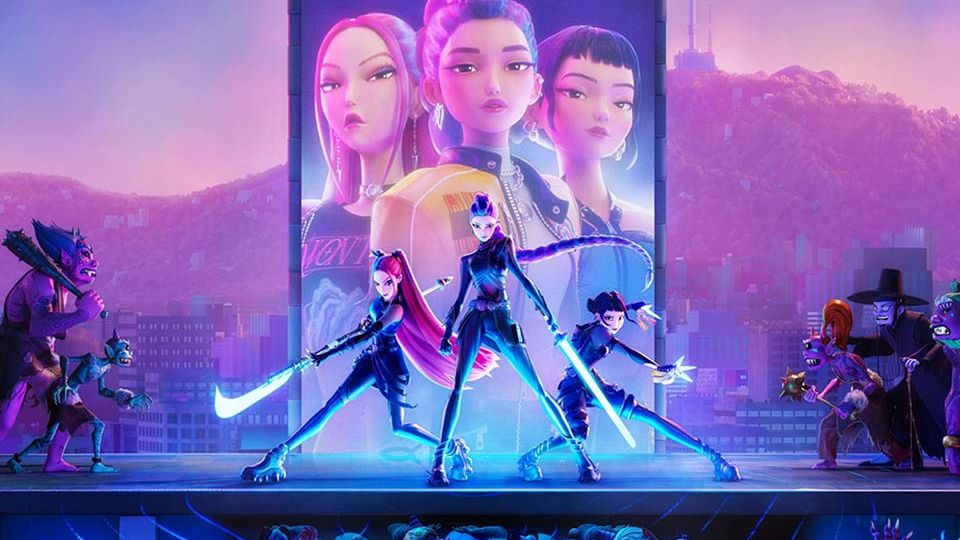November 13, 2025
SEOUL – Sometimes, especially when it comes to politics, it is tempting to believe that the world is made of good and evil, and that, fundamentally, there are those who are on the side of the angels and then there are the demons.
We might think that we are angels, and that others are demons who we would do well to hunt down and eliminate from society. In these moods, it seldom occurs to us that there may be bad humans and good demons — or beings who are half-human, half-demon. “KPop Demon Hunters” delves into such problems.
In this critically acclaimed animated fantasy film from Netflix, Rumi, Mira and Zoey make up the demon-hunting trio of the K-pop girl group Huntrix, whose mission is to seal the Honmoon with their songs so that no demons can cross over to this world. The rival Saja Boys include Juno and other demons disguised as humans. In the war between them, their weapons are songs, not spears or guns.
Rumi, the leader of Huntrix, has strange patterns all over her body because her father was a demon. She is ashamed of these marks and keeps them secret. Juno, her main rival in Saja Boys, has the same patterns because he, too, is half human and half demon. These demonic patterns on their bodies are a constant reminder of the shame from which they can never escape.
While rehearsing, Rumi suddenly loses her voice. She confesses, “I spent my whole life keeping this secret, this shame of what I am. And the more I hid this shame, the more it grew and grew until it destroyed the one thing that gave me a purpose — my voice.” Meanwhile, Rumi and Juno become attracted to one another. Thanks to Juno’s support and advice, Rumi regains confidence and her voice.
Together with Juno, Rumi sings, “Now I know we can change/ You got a dark side/ What if we both tried to fight what we’re running from?/ We can’t fix it if we never face it/ What if we find a way to escape it?/ We could be free, free!/ Let the past be past till it’s weightless.” Listening to their beautiful duet strikes me just how — very unlike Rumi and Juno — some of our politicians today do not try to free themselves from the pressures of the dark past, but remain hopelessly chained to it. Meanwhile, they create scapegoat demons to blame for their misery and to justify acts of revenge.
“KPop Demon Hunters” teaches us that reconciling with our adversaries or political foes will bring forth a better outcome than antagonizing each other. There are many images throughout the movie that reinforce this optimistic message. During an autograph session for fans of Huntrix and Saja Boys, their respective fans are initially divided in half, lining up separately to get autographs. But when the two K-pop groups decide to sit side by side, their fans gather in one place, making the event successful and harmonious.
The film emphasizes three key themes: 1. The world is not simply made of good and evil, or angels and demons. 2. Do not be ashamed of differences. 3. Hybridity is a strength, not a weakness. However, few people have mentioned the film’s complex, gripping themes that deeply move viewers. They only talk about the huge success and enormous popularity of the movie. The movie’s astonishing success is undeniably rooted in those compelling themes that strongly appeal to us all.
As the film reveals to us, there is only a thin line between humans and demons. There are also those people in the middle ground of our society, free from the either/or of binary opposition. They can both criticize and embrace polar extremes. There are spiritual hybrids who can cross over boundaries and mingle with different cultures and diverse people.
In the movie, the leaders of the two vocal groups, Rumi and Juno, are half human and half demon. They show that hybridity and diversity are advantages, not disadvantages. Likewise, K-pop, too, has appealed to the world primarily because it is a hybrid cultural entity skillfully combining Korean dancing and Western-style singing.
“KPop Demon Hunters” is both a profound insight into and a powerful criticism of our society where we antagonize “others” as demons, disparage cultural and ethnic differences and think of hybridity as a mistake. Setting aside hate and vengeance, the movie suggests, we can instead embrace those who are different from us and care about others who need help to make the world a better place to live.
Watching “KPop Demon Hunters,” we come to realize that if we become self-righteous, thinking of ourselves as angels and others as demons we should hunt and destroy, we can unwittingly and ultimately become demons ourselves. The mesmerizing movie suggests that K-pop can spread messages of reconciliation and heal our psychic wounds through songs.
Kim Seong-kon is a professor emeritus of English at Seoul National University and a visiting scholar at Dartmouth College. The views expressed here are the writer‘s own. — Ed.


